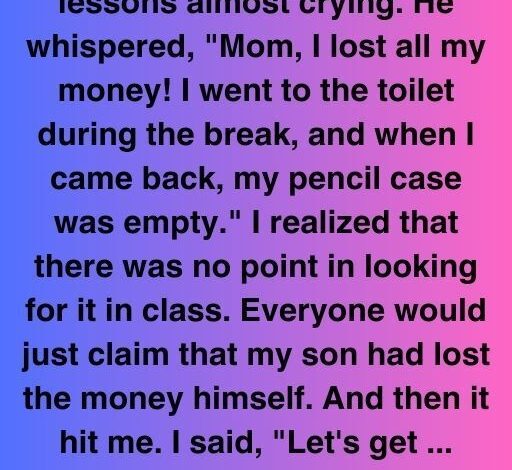The Pencil Case And The Lemonade Stand

ADVERTISEMENT
🍋 Leo’s Lemonade: When Integrity Turns Loss Into Legacy
My son came home from school, eyes glassy, voice barely above a whisper.
ADVERTISEMENT
“Mom… I lost all my money. I went to the bathroom, and when I came back, my pencil case was empty.”
He had been saving it for weeks—doing chores, skipping sweets. Every coin was earned. Now, just gone.
ADVERTISEMENT
I didn’t tell him to report it. I knew how classrooms work. By the time you ask, fingers are already pointed the wrong way.
Instead, I said, “Let’s get creative.”
He sniffled, confused. “Creative?”
“Remember that summer project we talked about? Let’s start early.”
He didn’t speak. Just stared—hurt sitting heavy in his chest.
“I just want it back,” he said.
“I know, sweetheart. But sometimes, we don’t get back what we lost. We build something better.”
I walked to the pantry and grabbed a bag of lemons.
“We’re going to sell lemonade.”
His eyebrows rose. “Like with a stand? Like in cartoons?”
“Exactly like that.”
The next afternoon, Leo and I planned it all. He made a shopping list. Researched lemonade ratios. Took notes in an old notebook with the focus of a CEO in a pint-sized body.
Saturday morning, we built the stand. Painted a sign together:
Leo’s Lemonade – 50¢ a cup
Fresh. Cold. Honest.
“Honest,” he insisted. I didn’t ask why—but I had a feeling.
Our first customer was Mr. Franco from next door. He sipped, blinked, and smiled.
“This is fantastic! You made this yourself, Leo?”
Leo nodded, chest rising.
“I’ll take another. Keep the change.”
“He gave us two dollars,” Leo whispered.
“Your first profit,” I smiled.
And it didn’t stop. By midday, we had sold over thirty cups. Teens took selfies by the sign. The mail carrier said it was “lemonade with magic in it.”
By 2 PM, sweaty and happy, Leo counted the money.
“Mom,” he said, “we made more than I lost.”
“And you did it all honestly.”
He paused. That word again.
“Leo… why do you keep saying that?”
He hesitated.
“Because I think I know who took my money.”
My heart thumped. “Want to tell me?”
“I think it was Ivan. He watched me count it. And when I got back, he was near my desk—even though his seat’s two rows away.”
“Are you sure?”
“Not 100%. But I think… yeah.”
I asked, gently, “What do you want to do?”
Leo looked up.
“Nothing. That’s why I added ‘honest.’ I don’t want to be like him. I want to prove you can still win by being good.”
I hugged him. Tighter than usual.
“You already are.”
The stand kept growing. We added a cooler, cookies we baked together, even a bowl for neighborhood dogs. Leo greeted everyone. People stayed just to chat.
Then one Sunday, Ivan walked up. Hands deep in his pockets.
“Hey,” he mumbled. “I heard your lemonade’s good.”
Leo looked at me, then at him.
“Want a cup?”
Ivan nodded. Sipped quietly.
“I’m sorry,” he said.
Leo stayed quiet.
“For what?” he asked.
“For taking your money,” Ivan admitted. “I was hungry. I thought you wouldn’t notice. But I felt awful.”
Leo blinked. Then shrugged.
“Okay.”
“Okay?” Ivan asked, stunned.
“Yeah. You could’ve asked. But thanks for telling me.”
Ivan hesitated.
“Can I help? At the stand?”
Leo nodded.
“Only if you help squeeze the lemons.”
“Deal.”
From that day forward, Ivan showed up—early, eager. He added mint leaves. Came up with new signs. Their friendship bloomed like sunflowers.
Weeks later, they pooled profits to buy sandwiches for unhoused folks downtown.
“We’re making money honestly,” they said.
“Let’s use it for something good.”
Their story spread. A local paper wrote about “The Two Lemonade Boys”—turning a stolen moment into a shared mission. Strangers donated. Neighbors came from blocks away just to meet them.
By summer’s end, they had earned over $600. Half went to a food bank. Half they saved.
We held a small celebration. Lemonade. Cookies. Laughter.
That night, as I tucked Leo in, he asked:
“Was it good that my money got stolen?”
I smiled.
“I think something good came from it. And that matters more.”
Sometimes we think justice means punishment. But the purest justice?
Transformation.
Leo could’ve shouted. Pointed fingers. Shut down.
Instead, he built.
He forgave.
He turned loss into legacy.
So if you’ve ever felt wronged—remember: what happens next is yours to choose.
You can rebuild with integrity.
You can turn a setback into a stand.
And you might just inspire someone else to change.
If this story gave you a little hope, share it.
Kindness still matters.
And it’s contagious—in all the best ways.




